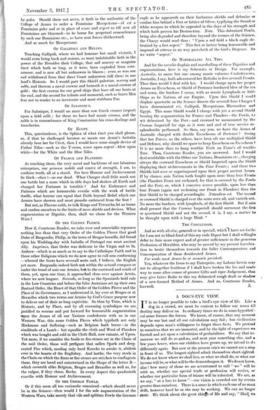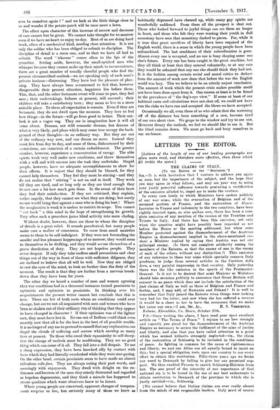A DOG'S-EYF. VIEW.
IT is no longer possible to take a bird's-eye view of life. Like a dog in a crowd, we must be content to follow our noses till destiny may deliver us. In ordinary times we do in some hypotheti- cal sense foresee the future. We know, of course, that any moment may be our last and all our calculations may fail ; but civilizatioa depends upon man's willingness to forget these facts. We pretend to ourselves that wo are immortal, and by the light of experience we foretell and act upon a calculation of probabilities. We say that to- morrow we will do so-and-so, and next year something else, and a few years hence, when our children have grown up, we intend to do differently again. But now at the present cries we cannot see a step in front of us. The longest-sighted admit themselves short-sighted- We do not know where we shall live, or what we shall do, or what our income will be, or what will be the de man& upon it. We do not know. alas ! how many of those we are accustomed to call " we " will be with us, whether our special trade or profession will revive, or whether our particular form of leisure will be tolerated. We are, as we say, " at a loss to know "—our vision is crowded out by events greater than ourselves. There is a sense in which each one of us most drift, however hard he or she may be working. We can no longer steer. We think about the great thinrs of life and say, "Shall we
ever be ourselves again ? " and we look at the little things close to us and wonder if the potato-patch will be once more a lawn.
The effect upon character of this increase of sorrow and decrease of care cannot but be great We cannot take thought for to-morrow even if we have no heart to enjoy to-day. Most of us are doing hard work, often of a mechanical kind, needing close attention. It is not only the soldier who has been obliged to submit to discipline. The discipline of detail is a stern one, and to that we have all had to submit. The word " irksome " comes often to the lips of the grumbler. Setting aside, however, the small-spirited men who whimper because they cannot make up their minds to inconvenience, there are a great number of usually cheerful people who find the present circumscribed outlook—we are speaking only of each man's private horizon—distressing. They have lost the pleasure of plan- ning, They have always been accustomed to feel that, however disagreeable their present situation, happiness lies before them. This, that, and the other fortunate event will come to pass, they feel sure ; their undertakings, failures at present, will succeed ; their children will take a satisfactory turn ; they mean to live in a mom suitable place. To them all expectation is roseate. Even if they are fortunate, they do not dwell upon the moment They love to feel how things—in the future—will go from good to better. Their out- look is not a vague one. They see in imagination how it will all some about. Dreams, not wild romantic dreams, but dreams of what is very likely, and plans which may coins true occupy the back- ground of their thoughts—in an ordinary way. But they are out of the ordinary way now, and can dream no more. Instead they must live from day to day, and some of them, disheartened by their estrictions, are conscious of a certain enfeeblement. The greater number, however, experience a concentration of energy. The able spirits work very well under new conditions, and throw themselves with a will and with success into the task they undertake. Stupid , people, however, have no adequate accomplishments to show for their efforts. It is unjust that they should be blamed, for they cannot help themselves. They feel they must be stirring—and they do not realize that " stirring " is not an end in itself They work till they are tired, and so long only as they are tired enough they do not care a bit how much gets done. In the sweat of their brow they find their satisfaction. If they are criticized, they explain, rather angrily, that they cannot see what they are doing; but surely no one would bring that against a man who is doing his beet ! Where the imagination is weak it is useless to restrict its scope. You cannot " cut back " a thin mind in the hope of strengthening its growth. Very often such a procedure turns blind activity into mere chafing. W ithout doubt, however, there are those to whom the discipline of details is a great relief. It sounds paradoxical, but many people make care a metier of conscience. To cease from small anxieties seems to them to be self-indulgent if they were not forestalling the smaller and less pleasant happenings of to-morrow, they would seem to themselves to be drifting, and they would accuse themselves of a grave dereliction of duty. They are not hopeless people. They never despair. If only they take endless small precautions and clear things out of the way in front of them with sufficient diligence, they are inclined to believe that all will be well. Now they are obliged to rest the eyes of the mind, to look no further than the duty of the moment The result is that they are further from a nervous break- down than they have been for years.
The other day we heard a number of men and women agreeing that war conditions had in a thousand instances turned pessimists to optimists and optimists to pessimists. In thinking over his acquaintances the present writer cannot but conclude that thin ie true. There are few of both aorta whom no condition's could ever change, but are we not all acquainted with men and women who have been so shaken out of their ordinary run of thinking that they appear to have changed in character ? If their optimism was of the lighter sort, they must have lost it No one out of Bedlam could think even secretly now that all is for the beet in the best of all possible worlds. It is no longer of any use to pretend to oneself that any explanation can dispel the clouds of suffering and sorrow which envelop so many lives at present. To those who owed their equanimity to self -decep. lion the change of outlook must be maddening. They see no good thing which can come of it all. They fall into a dull despair. To use a slang expression, they have been knocked silly by contact with facts which they had literally overlooked while they were star-gazing. On the other hand, certain pessimists seem to have made an almost ridiculous voile-face. They are always eating their past words, and seemingly with enjoyment They dwell with delight on the en- durance and heroism of the men they utterly distrusted and regarded as hopeless degenerates, and they think a miracle has happened to create qualities which wiser observers knew to be latent.
Where young people are concerned, apparent changes of tempera- went surprise us less, but certainly many of those we knew as habitually depressed have cheered up, while many gay spirits are wonderfully saddened. From them all the prospect is shut out Those who looked forward to joyful things can see them no longer in front, and those who felt they were wasting their youth in dull monotony have seen that monotony dashed to pieces. For, while it is true that great sacrifices of liberty have been required of the English world, there is a sense in which the young people have been enfranchised. The last semblance of their subordination is gone. Almost every one is occupied, and no one is busy shaping some ono else's future. Every one has been caught in the great machine, but they all think at least that they entered voluntarily, or at any rate they would be ashamed that any one else should think they had not. It is the fashion among certain social and moral critics to deduce from the amount of work now done that before the war the English world was lazy. This we believe to be an utterly unjust conclusion. The amount of work which the present crisis makes possible could not have been done apart from it One reason at least is to be found in the prevalence of " the dog's-eye view." If some at least of our habitual cares and calculations were not shut off, we could not have run the risks we have run and accepted the blows we have accepted.
Occasionally we all, even those of us who admit that the screening off of the distance has been something of a rest, become tired of our own short view. We grope to the window and try to see out However dreary the outlook, we feel we should like to see it But the blind remains down. We must go back and busy ourselves in our enclosure.















































 Previous page
Previous page